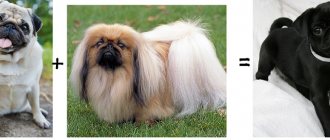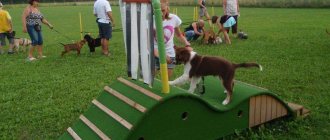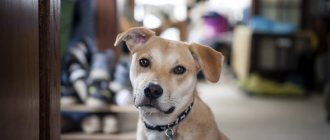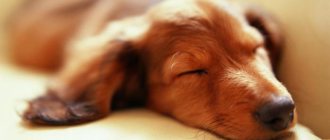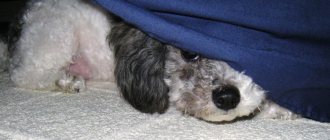Dogs, like people, need good sleep and rest. Adult animals sleep from 12 to 14 hours. Puppies require up to 20 hours a day. The more a pet rests, the better it exhibits physical activity, it is more balanced and calm. We’ll talk further about what sleep time depends on and how it affects the animal.
Stages of sleep
Dog sleep is similar in structure to human sleep and goes through several stages:
- Nap. The dog doesn't want to sleep, but he needs rest. Therefore, he lies down, closes his eyes and plunges into a state on the verge of sleep and wakefulness. He can hear everything that is happening around him, and at any moment he is ready to jump up.
- Shallow sleep. If the dog feels tired, it lies down and falls into a shallow sleep. The body relaxes and regains strength, but a loud sound can easily snap it out of this state.
- Deep dream. After some time, if not disturbed, the dog sinks deeper and enters the stage of deep, dreamless sleep. He is relaxed, his body is motionless, he sniffles or even snores.
- Quick sleep. After some time, deep sleep turns into rapid sleep - this is the stage of dreams when the brain is activated and processes the impressions received. The dog twitches its paws, its eyes move under its eyelids, sometimes it whines or barks, wags its tail, and changes its position. The duration of this stage is short.
Deep and fast phases replace each other, like in humans. If one of them is missing, the animal will not truly rest.
When and how do dogs sleep?
The domestic dog is a faithful pet for humans, but traces of its wolf ancestors have not disappeared from its genes. That’s why her sleep structure is the same as theirs.
The wolf sleeps as much as he can afford. In good times, he gets up in the morning, hunts with the pack, eats and goes to bed until the evening. In the evening he wakes up, eats, plays with the flock and goes to bed again until his turn comes to be on duty. When good times give way to bad, the wolf sleeps when he falls exhausted or when he finally manages to catch something.
A dog also sleeps according to the same principle: in good times, it dozes after walking and eating, sleeps deeply at night, so that in the morning it can wake up and go for a walk again.
She sleeps up to sixteen hours a day , and the rest of the time she spends energy and has fun.
Although the actual figure depends, of course, on many factors.
Pedigree
Oddly enough, the breed of the dog also affects the duration of its sleep. This is due to the difference in size and weight of the animal. For example, small breeds such as Yorkies, lapdogs, Spitz, Chihuahuas, Shih Tzus, and dachshunds are active most of the time. They need only 12 hours to rest.
Large dogs, for example, shepherds, huskies, terriers, mastiffs, and St. Bernards, like to sleep longer - up to 16-18 hours a day.
Animals that are engaged in protection, herding livestock (for example, Siberian husky, collie) sleep for short periods of time and are ready to be active for a long period of time. Out of boredom and idleness, dogs can sleep for several hours without waking up.
Observing your pet, you will notice that companion breeds over time begin to imitate the daily routine of their owner. If he sleeps until lunch or goes to bed early in the evening, then the dog will not deny himself the pleasure of taking a nap after eating or going to bed with his owner.
Properly selected daily routine and nutrition, moderate physical activity and active games contribute to quality sleep. Good rest is the key to your pet's health. Keep track of how much your dog sleeps and how it behaves, and then you can promptly detect a problem or changes in health.
Sleep depending on the dog's age
Just like people, dogs sleep different amounts of time at different times in their lives.
A puppy spends most of its life sleeping for up to a month, waking up only to eat. He is still small, his body is growing with might and main, nothing is required of him yet.
Up to three months, a puppy becomes more active and is awake for four hours a day. He not only has time to eat, but also explores the surrounding area, plays with his brothers and sisters, meets the breeder, and gets very tired.
A puppy up to six months is awake for about six hours. He already goes for walks with his owner, already learns simple commands, already understands requests like “place!” or “who ate the sock, huh?”
By the age of six months, he switches to the regime characteristic of mature dogs. He sleeps for up to two-thirds of the day, and the rest of the time he walks, communicates with people, continues to learn commands and has an intense time.
An old dog - depending on the breed, a dog can become old at seven years old, or maybe at twelve - returns to the same routine that it had as a puppy. He sleeps for eighteen to twenty hours and no longer runs for a stick as quickly as before.
What does this depend on?
The main factor determining the length of an animal's sleep is its age. The duration of rest is also affected by:
- volume of physical activity;
- presence of diseases;
- stress;
- body size and weight;
- environment;
- daily regime.
Intense training and various diseases lead to fatigue and reduce rest time. Stress and external stimuli interrupt deep sleep. Because of this, the dog does not get enough sleep and becomes more irritable.
Age
Puppies need to sleep up to 20 hours a day to regain energy. Their body spends a large number of calories on the growth and development of the body. Until the age of three months, animals do not respond to external stimuli, such as loud noise or bright light, so newborns' sleep is not interrupted. At the same time, the dog should not be hungry. Due to its fast metabolism, a two-month-old puppy may feel hungry. Therefore, at the age of 1-2 months, dogs often wake up and whine, demanding food.
Starting at 4 months, puppies begin their teenage period. At this time, the development of all body systems is almost complete, so pets sleep up to 18 hours a day . At 4-5 months, their nervous system reacts more actively to external stimuli, so the puppy may wake up at night.
When a dog ages, reaching 7-10 years of age, age-related changes in its body trigger the process of cell degeneration. Metabolism slows down, which is why the dog does not receive the required amount of energy. To compensate for energy costs, an elderly dog must sleep at least 20 hours a day. Moreover, compared to a puppy, his sleep is easily interrupted by external factors: smells, light noise, touch, light.
Older dogs prefer to nap after daily walks or after meals.
Breed
Dog breeds vary in size and body weight, so each type of animal requires different amounts of sleep. Decorative pets with a small body - Yorkshire terriers, lap dogs, Spitz dogs - do not need long rest. Their body has a high metabolic rate, which is why cells recover faster and begin to produce energy.
Dogs with larger bodies require up to 15-18 hours of rest. This is due to the fact that to maintain the functioning of skeletal muscles they need constant physical activity. Large breeds differ in temperament - due to their size, these dogs practically do not pay attention to external stimuli. As a result, their sleep lasts longer and is uninterrupted.
Health status
In the absence of chronic diseases, the dog should sleep from 14 to 16 hours a day, but if between the ages of 3 and 7 years the pet does not get enough sleep, this indicates the development of a pathological process in its body. Typically, a number of diseases lead to reduced sleep time.
- Obesity. Accumulations of visceral fat compress internal organs, leading to shortness of breath and deterioration of tissue microcirculation. Fat tissue has a negative effect on the circulatory system, which is why the brain does not receive the required amount of oxygen and nutritional compounds. As a result, the sleep hormone, or melatonin, stops being produced in the required volume, metabolism slows down, which leads to sleep disturbances.
- Pathologies of the cardiovascular system . Problems with the heart, blood vessels and blood pressure worsen the general condition of the body.
- Infectious diseases that provoke an increase in body temperature. During the acute period, hyperthermia interrupts sleep. The dog doesn't get enough sleep.
- Arthritis . Joint problems lead to pain, which makes it harder for your dog to sleep. If your pet makes a sudden movement or takes an incorrect position while sleeping, the pain syndrome may intensify and the dog will most likely wake up.
- Kidney failure. Damage to the urinary system disrupts the water and electrolyte balance in the body, which leads to metabolic and hormonal disorders. As a result, melatonin production is reduced, which causes insomnia.
Fighting the disease takes a lot of energy, which leads to the development of stress. An exhausted pet begins to suffer from restless sleep. Lack of rest only increases stress and leads to disruption of the psycho-emotional state. The dog becomes aggressive, irritable and disobedient.
The development of the disease is indicated by lethargy and loss of appetite. In such a situation, it is necessary to take the animal to the veterinarian and provide the pet with a comfortable and warm place to sleep.
Environment
The quality and duration of sleep is affected by the general atmosphere in the house. If you don't give your dog attention, he will start to get bored. The pet will kill time with the help of sleep - usually the animal constantly dozes throughout the day. As a result, the dog will not sleep at night. This behavior is only normal for one-week-old puppies, whose eyes and ears do not open until 14 days of life. Newborns do not recognize the time of day and require regular care.
In other cases, it is necessary to accustom the dog to sleep at night, and also pay attention to its physical activity. A tired pet will fall asleep faster and will not bother its owner with nocturnal activity.
During sleep, especially in 1 month of life, the dog should not wake up from external stimuli. The pet owner must learn to respect the rest of his dog, so you should not play loud music or deliberately wake the animal. Restless sleep can disrupt a dog's psyche and destroy friendly relationships with humans.
Mode
After an adaptation period, the dog develops a daily schedule, thanks to which the animal regulates its sleep and wakefulness patterns. For proper rest, starting from the age of 5 months, it is necessary to regularly subject the animal to physical activity. Without games and proper activity, skeletal muscle atrophy occurs. Against the background of physical inactivity, the dog begins to eat and sleep a lot, which can lead to obesity. Thanks to intensive training, you can regulate the amount of sleep and maintain your pet's health.
In most cases, dogs are oriented toward their owner. If a person likes to sleep after lunch, his pet will also not refuse to take a nap. Owner habits are often adopted by companion dogs:
This behavior is not typical for hunting breeds such as beagles or retrievers. They develop an individual daily routine and do not tolerate disruption of rest.
Sleep in dogs is divided into a number of periods, each of which performs a specific task.
- Nap . The animal relaxes the skeletal muscles, giving rest to the nervous system and sensory organs. At the same time, the dog remains conscious, controlling the state of the environment. Napping is characterized as temporary and intermittent rest that can progress to full sleep.
- Shallow sleep. This period is the borderline transition from drowsiness to the deep phase of sleep. The dog continues to hear and see, retains its natural reaction to loud noise and light, but at the same time the activity of its nervous system decreases. Metabolism begins to slow down, muscle tone decreases.
- Deep dream. Complete rest for the musculoskeletal, nervous, endocrine and digestive systems of the animal. At this point, the dog may dream and make some movements with its paws, muzzle or mouth. The dog often makes sounds by whining or growling. This does not mean the appearance of a negative reaction directed at the owner. The pet does not respond to external stimuli.
- Quick sleep. Only the eyeballs move, indicating the continuation of dreams. The muscles remain relaxed and motionless. Thanks to this sleep phase, the dog regains psycho-emotional control and relieves stress. After REM sleep, the animal re-enters a state of light sleep before waking up.
Sleep and stress
And, of course, other factors besides age affect sleep patterns:
- Loads. A dog that spends a lot of time in the fresh air, walks with its owner, runs after a stick, follows commands and is constantly busy, sleeps deeply and soundly. On the other hand, if there is not enough load - and for this it is enough to walk the dog a little or walk with it at a calm pace, instead of games and commands - the dog becomes lethargic and sleeps most of the time, but shallowly and restlessly.
- Breed. Different breeds were bred for different things and their sleep patterns are also different. Working, hunting, and fighting breeds are tied to a daily routine and, although they sleep for long periods, they are very nervous if something goes wrong. Companion dogs, on the other hand, sleep long periods and soundly, regardless of the circumstances, because they were bred to live with a person in an apartment. Shepherd dogs sleep shallowly, with half an eye and are always ready to jump - they were bred to vigilantly watch the herd.
- Size. Small and very large dogs sleep up to eighteen hours, like puppies. This is what size affects.
- Health status. Sick dogs sleep longer than healthy ones and get tired faster. If an animal suddenly, without increasing the load, begins to sleep more, this is a reason for the owner, who knows how much a healthy dog should sleep per day, to be wary.
Individual characteristics also play a role. There are sleepy dogs, and there are energetic dogs that sleep less than others. If the dog feels well, eats with appetite, plays and walks with pleasure, there is no reason to worry.
But if the dog’s behavior has changed dramatically, you should contact a veterinarian.
Health
Your dog's overall health can affect how long he sleeps. Chronic diseases such as:
- Disorders of the cardiovascular system and blood pressure.
- Arthritis. Pain in the joints leads to the fact that the pet cannot fully relax. Any movement of the paws increases pain and disrupts sleep.
- Kidney diseases and renal failure. Disruption of the urinary system leads to a decrease in the production of melatonin, the hormone responsible for sleep.
- Infectious or viral diseases. For example, a dog may catch a cold while walking in the rain, its temperature will rise, which will affect the quality of sleep.
- Stress. The environment also affects your pet's health. If there is shouting, quarrels, fights in the family, or the animal is twitching uncontrollably from children, kicking, then he is constantly in a state of stress. The animal sleeps poorly, becomes irritable and aggressive.
Another important factor affecting sleep is obesity in a dog. The owner’s desire to stuff the pet with everything, an incorrectly selected diet or a sedentary lifestyle leads to the accumulation of visceral fat in the abdominal cavity. It puts pressure on the internal organs, shortness of breath occurs, and blood circulation throughout the body is disrupted.
Important! To restore quality sleep in a dog, you need to seek help from a veterinary clinic and conduct a series of examinations and treatment.
Dog's daily routine
The advantage of a dog as a pet is that it easily adapts to the owner’s regime. The daily routine of a dog who lives in an apartment with a person who works looks like this:
- waking up at the alarm with the owner, walking, breakfast;
- sleeping alone while the owner goes to work - sometimes the dog gets up, drinks water, looks out the window at cars and listens to sounds outside the door, but most of the time he dozes or sleeps soundly;
- meeting the owner from work, a long walk to get tired, dinner;
- a long, sound night's sleep before a wonderful new day.
On weekends, they add variety to this routine: they take the dog out into the forest until the evening, play with it, run around, let it off the leash and explore new places. Such an abundance of movement will improve the dog’s condition and allow him to sleep more soundly on weekdays.
If a dog does not sleep at night, howls or barks at cars, this means that he does not have enough movement in his life and does not have time to expend energy.
The recipe for a good doggy sleep is lots of fun outdoors, followed by food.
